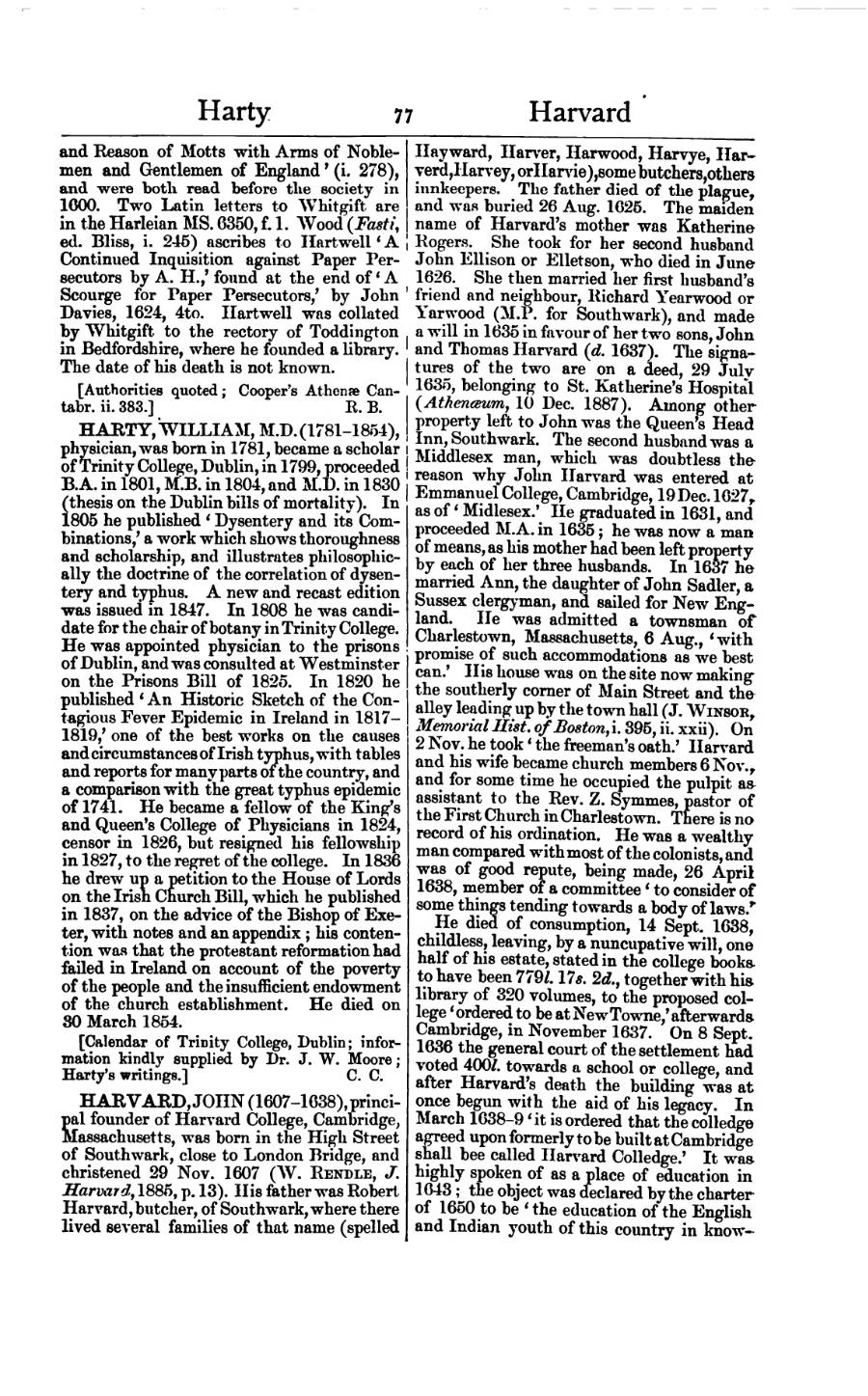and Reason of Motts with Arms of Noblemen and Gentlemen of England’ (i. 278), and were both read before the society in 1600. Two Latin letters to Whitgift are in the Harleian MS. 6350, f. 1. Wood (Fasti, ed. Bliss, i. 245) ascribes to Hartwell ‘A Continued Inquisition against Paper Persecutors by A.H.,’ found at the end of ‘A Scourge for Paper Persecutors,’ by John Davies, 1624, 4to. Hartwell was collated by Whitgift to the rectory of Toddington in Bedfordshire, where he founded a library. The date of his death is not known.
[Authorities quoted; Cooper's Athenæ Cantabr. ii. 383.]
HARTY, WILLIAM, M.D. (1781–1854), physician, was born in 1781, became a scholar of Trinity College, Dublin, in 1799, proceeded B.A. in 1801, M.B. in 1804, and M.D. in 1830 (thesis on the Dublin bills of mortality). In 1805 he published ‘Dysentery and its Combinations,’ a work which shows thoroughness and scholarship, and illustrates philosophically the doctrine of the correlation of dysentery and typhus. A new and recast edition was issued in 1847. In 1808 he was candidate for the chair of botany in Trinity College. He was appointed physician to the prisons of Dublin, and was consulted at Westminster on the Prisons Bill of 1825. In 1820 he published ‘An Historic Sketch of the Contagious Fever Epidemic in Ireland in 1817–1819,’ one of the best works on the causes and circumstances of Irish typhus, with tables and reports for many parts of the country, and a comparison with the great typhus epidemic of 1741. He became a fellow of the King's and Queen's College of Physicians in 1824, censor in 1826, but resigned his fellowship in 1827, to the regret of the college. In 1836 he drew up a petition to the House of Lords on the Irish Church Bill, which he published in 1837, on the advice of the Bishop of Exeter, with notes and an appendix; his contention was that the protestant reformation had failed in Ireland on account of the poverty of the people and the insufficient endowment of the church establishment. He died on 30 March 1854.
[Calendar of Trinity College, Dublin; information kindly supplied by Dr. J. W. Moore; Harty's writings.]
HARVARD, JOHN (1607–1638), principal founder of Harvard College, Cambridge, Massachusetts, was born in the High Street of Southwark, close to London Bridge, and christened 29 Nov. 1607 (W. Rendle, J. Harvard, 1885, p. 13). His father was Robert Harvard, butcher, of Southwark, where there lived several families of that name (spelled Hayward, Harver, Harwood, Harvye, and otherwise), some butchers, others innkeepers. The father died of the plague, and was buried 26 Aug. 1625. The maiden name of Harvard's mother was Katherine Rogers. She took for her second husband John Ellison or Elletson, who died in June 1626. She then married her first husband's friend and neighbour, Richard Yearwood or Yarwood (M.P. for Southwark), and made a will in 1635 in favour of her two sons, John and Thomas Harvard (d. 1637). The signatures of the two are on a deed, 29 July 1635, belonging to St. Katherine's Hospital (Athenæum, 10 Dec. 1887). Among other property left to John was the Queen's Head Inn, Southwark. The second husband being a Middlesex man, which was doubtless the reason John Harvard was entered at Emmanuel College, Cambridge, 19 Dec. 1627, as of ‘Midlesex.’ He graduated in 1631, and proceeded M.A. in 1635; he was now a man of meanss, as his mother had been left property by each of her three husbands. In 1637 he married Ann, the daughter of John Sadler, a Sussex clergyman, and sailed for New England. He was admitted a townsman of Charlestown, Massachusetts, 6 Aug., ‘with promise of such accommodations as we best can.’ His house was on the site now making the southerly corner of Main Street and the alley leading up by the town hall (J. Winsor, Memorial Hist. of Boston, i. 395, ii. xxii). On 2 Nov. he took ‘the freeman's oath.’ Harvard and his wife became church members 6 Nov., and for some time he occupied the pulpit as assistant to the Rev. Z. Symmes, pastor of the First Church in Charlestown. There is no record of his ordination. He was a wealthy man compared with most of the colonists, and was of good repute, being made, 26 April 1638, member of a committee ‘to consider of some things tending towards a body of laws.’
He died of consumption, 14 Sept. 1638, childless, leaving, by a nuncupative will, one half of his estate, stated in the college books to have been 779l. 17s. 2d., together with his library of 320 volumes, to the proposed college ‘ordered to be at New Towne,’ afterwards Cambridge, in November 1637. On 8 Sept. 1636 the general court of the settlement had voted 400l. towards a school or college, and after Harvard's death the building was at once begun with the aid of his legacy. In March 1638–9 ‘it is ordered that the colledge agreed upon formerly to be built at Cambridge shall bee called Harvard Colledge.’ It was highly spoken of as a place of education in 1643; the object was declared by the charter of 1650 to be ‘the education of the English and Indian youth of this country in know--
